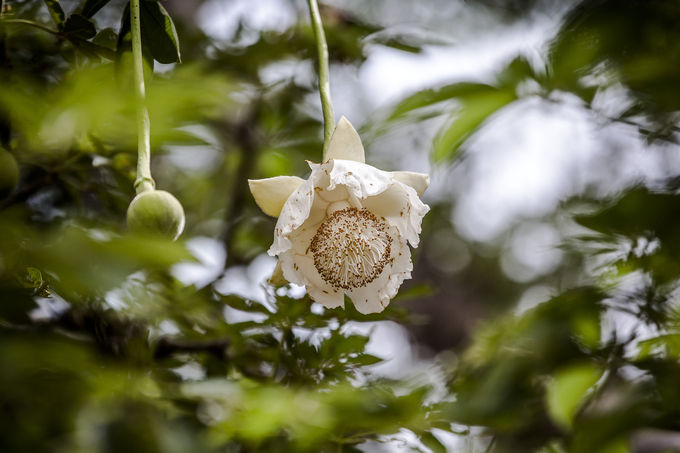May 24, 2025 | 16:18 GMT +7
May 24, 2025 | 16:18 GMT +7
Hotline: 0913.378.918
May 24, 2025 | 16:18 GMT +7
Hotline: 0913.378.918

A baobab flower.
Aspiring and established plant scientists from around Africa gathered in Kenya’s capital for a workshop to review what has been achieved so far by the African Orphan Crops Consortium (AOCC). In its first decade, the AOCC has empowered more than 172 scientists, nearly 40 percent of whom have been women, and 28 African countries in the use of genomics-assisted approaches to crop improvement.
The workshop, co-sponsored by the Food and Agriculture Organization of the United Nations (FAO), reviewed a number of themes, including: what genomics can contribute to crop development; how to distribute new cultivars for widespread use; what partnership models work best; and, how to strengthen the work force for local private-sector business development in the field.
“Africa is home to a rich diversity of under-utilized crops, often referred to as ‘orphan crops’,” said FAO Director-General QU Dongyu in opening remarks via video message. Such crops – including local staples such as millets and exotic fruits such as mangosteen – have long played a vital role in local diets, cultural heritage and ecosystems, but have remained neglected in research, investment and policy discussions.
Noting that reducing hunger and ensuring the sustainable production of more nutritious foods to ensure healthy diets is particularly challenging in Africa, Qu added that “we will need to leverage science and innovation”.
What the Consortium does
Since its establishment in 2011, the AOCC, working with its African Plant Breeding Academy (AfPBA) – a training facility run by the University of California, Davis –, has developed new tools and sequenced the genomes of 75 of the 101 target crops and trees.
Once sequenced, researchers analyze the germplasm panel of each crop, putting the information into the public domain for use by plant breeders and other crop scientists with the goal of catalyzing the development of improved varieties and cultivars that can be released to farmers.
The target crops were chosen through a participatory approach by scientists. Development practitioners, producers and consumers with an eye to local tastes, dietary and nutritional needs – many are rich in critical minerals and vitamins - and income potential.
“The focus on African orphan crops is not just about food security. It is about empowering communities to cultivate crops that are resilient, nutritious and locally adapted,” Qu said.
Some of the ‘orphan’ crops assessed so far are types of mustard, okra, breadfruit, melon, taro, pumpkin, yams along with wild custard apples and vine spinach and Plectranthus rotundifolius, an indigenous variety of potato. Better-known African crops such as tef and fonio were also investigated, as were some non-native crops such as amaranth, avocados and prickly pears.
A full list of the 101 target crops and trees is available here.The workshop also focused on how to more deeply embed African orphan crops in national agrifood strategies and on identifying the next steps to take the essential elements of the AOCC model to the next level in African countries and elsewhere.
FAO’s Committee on Agriculture, a key governing body of the FAO, at its recent 29th Session in October 2024, further highlighted the potential of neglected and underutilized species (NUS) and crop adaptation to climate change, in accelerating the transformation, towards more diverse, inclusive, productive, resilient and sustainable agrifood systems.
Founding partners of AOCC include the African Union Development Agency, World Agroforestry, Mars Inc., the University of California Davis and the World Wildlife Fund. Nearly 40 more partners, including prominent global companies, universities and the U.S. Department of Agriculture have joined the movement to alleviate malnutrition and end stunting in Africa.
“We need to produce more with less – using solutions from Africa, for Africa,” FAO Director-General said. He noted the possible synergies between the AOCC project and FAO’s One Country One Priority Product (OCOP) initiative and the global Vision for Adapted Crops and Soils (VACS).
The latter was launched by the United States of America and is being supported by FAO and partners in a bid to accelerate plant breeding efforts for targeted crops and unlock the potential of orphan crops to become “opportunity crops” helping farmers better manage soil health, adapt to a changing climate, build new value chains and improve nutrition and food security.
Related work by FAO includes the recent publication of the Compendium of forgotten foods in Africa and a project in Ghana where FAO and acclaimed chief Fatmata Binta are supporting women fonio producers.
Qu emphasized the importance of making sure that crop improvement technologies and innovations are accessible to all, and of developing local capacity in the scientific skills involved. “We need to sustain the momentum of these significant advances and continue ensuring that African farmers and scientists have access to the best tools, equipment and technologies,” the Director-General said.
(FAO)

(VAN) Alt Carbon has raised $12 million in a seed round as it plans to scale its carbon dioxide removal work in the South Asian nation.

(VAN) Attempts to bring down the price of the Japanese staple have had little effect amid a cost-of-living crisis.

(VAN) Fourth most important food crop in peril as Latin America and Caribbean suffer from slow-onset climate disaster.

(VAN) Shifting market dynamics and the noise around new legislation has propelled Trouw Nutrition’s research around early life nutrition in poultry. Today, it continues to be a key area of research.

(VAN) India is concerned about its food security and the livelihoods of its farmers if more US food imports are allowed.

(VAN) FAO's Director-General emphasises the need to work together to transform agrifood systems.

(VAN) Europe is facing its worst outbreak of foot-and-mouth since the start of the century.